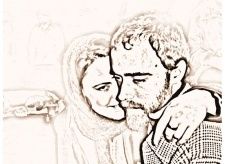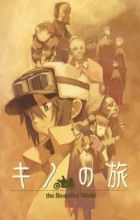I had 2 (main) reasons for joining this site. One was that my list of finished titles had grown too large for me to keep it all in my head. The second was to use others lists and recommendations to generate new titles for me to consume.
Greatest hope for this season: no hope for this season. *despairing sigh*
This desolate disillusionment has continued for a while now. As you can see, I've focused on manga for a bit, as a consequence. Since I'm using a manga focused site now, I only update my list here when I complete a title.
Most recent shocking discovery (in a good way): Doctor Du Ming (manhua)
Previous Shocking Discoveries
Sasameki Koto (manga)
Butakai Ouji to 100-kai no Kiss (manga)
School Rumble (manga and subbed)
No. 5 (manga)
Shiki (subbed)
Oyasumi Punpun (manga)
Zettai Shounen (subbed)
Mawaru Penguindrum (subbed)
Gankutsuou (subbed)
Yojouhan Shinwa Taikei (subbed)
Some thoughts on my personal bias
Hierarchy of values: Story is King! - A story must be Engaging. Different people find different stimuli engaging. Therefore, below is a list that attempts to quantify what I value in my stories.
1) Character - A believable and consistent character. Motivated from within by some combination of forces including emotion, values, expectations, commitments, connections, goals, etc. Some of which are poorly understood or in conflict with others. Motivated from without by some combination of forces including the expectations of others , the limits of their resources, changes in their environment, etc. Some of which are poorly understood or in conflict with others. I expect to see struggle! Mistakes, accidents, bad decisions, poor judgement, human failings, failure... Out of these our characters can grow! Change, overcome, transcend, transform! Maybe just learn a new skill, eh? Above all NO SUPERHUMANS! SUPERHUMANS ARE BORING!!! I don't mean people with powers when I say superhumans. I'm talking about people who are too good to be true. People who master a lifetime of study in a week. People with perfect scores at all times. People who never make a poor decision or take the wrong action. You all know the characters I'm talking about. It's okay, even good, for the characters to get more accomplished as they acquire experience. It's appropriate for them to learn from their mistakes and overcome personal obstacles. Deus ex machina, where the resolution descends from "above" with no relation to the efforts of the characters, is unacceptable. Unless the point is to frustrate the character, the observer (me), or to introduce some necessary and new element (even then) it's just POOR STORYTELLING.
2) Plot - This is almost as important as character. Together they make up the bulk of the "story." Plot is how the situation develops through time. Where we are going and how we get there. It includes the background story (of the characters, their relationships, and the external factors which are effecting them), the reasons why characters feel and act, and role environment plays. Depending on the story, environment can perform a number of functions or even fulfill a major role (such as the villain). Traditional story plots will follow something like: The main character will be presented with a challenge to overcome. Various "characters" will confuse or clarify matters. The main character will "realize" some growth necessary to the resolution of the challenge. Whether the arc is over the length of an entire series or episodic, consistency is key. Since most plots are recycled the next value is...
3) Uniqueness - Novel device or interaction. Just about anything unexpected but consistent with the story. Tropes make for a decent foundation and quick introduction but real life has infinite surprise and variation. To keep me engaged I expect my entertainment to surprise me in some way.
4) Thought provoking - Some exploration of human nature, cosmic questions, socio-political quandaries, psychological puzzles, current issues, etc. The story must have relevance or provide good conversation starters. I realize some people want their stories to be mind-numbing. In my experience it's easier and more rewarding to get lost in a story with depth.
5) Emotional Effect - Am I moved by the work? Does it inspire me to action? Do I like it? Does it creep me out? How much can you identify with the characters? How compelling is the action? How nerve-wracking is the suspense? Does it change how I see the world? It doesn't matter how technically excellent a production is; if it doesn't give me an emotional reaction, I won't rate it above a 6.
6) . . . work in progress . . .
Meta-storytelling: Some authors just write a story. Some authors know where the story came from, who is in it, what it says. Neil Gaiman is a prime example of this kind of author. Terry Prachett to a lesser degree. To reveal mysteries in stock characters and show unsuspected depths in well know plots. To educate the reader while still entertaining; I know it's a just a story (I can see the authors hand) yet I'm drawn in. The author makes me feel like we are colluding together to create this world. Breaking the
fourth wall is not enough, and sometimes too much, to earn this label. Stock characters who never jump the tracks of the worn out plot are obviously insufficient no matter how much the writer shows their hand. When the author makes a reference back (homage, lamp-shading, ) to the stories that have gone before while retaining the integrity of the story they are writing. Hoshi no Samidare (manga) dances on this edge. Kino no Tabi (anime) is another clear example. Just to be clear; tearing down the fourth wall and being self-referential is POOR STORYTELLING done by a lazy author. Unless it's done by a master. Neil Gaiman makes constant references to the roots of his material without ever breaking the fourth wall. Terry Prachett uses the fourth wall as a plot device.
I lose patience with most harem and fan service. I suppose it's the combination of these two in one title that consistently spells doom for the story quality. It's hard to think of good harem title off the top of my head. I suppose the idea behind the harem is to produce a target rich environment for the author and increase stress on the main character. Sounds like a lazy author to me, not to mention it's never believably executed (if it can be). As for fan service, T&A, even attractive T&A, doesn't replace any of the necessary elements for a good story. Besides which, if it isn't incorporated appropriately it just detracts from the impact of the rest of the story. Sundome uses T&A to increase tension, move the story forward, and provide challenge for the characters. It's not tacked on to exploit the reader, it's incorporated to motivate the characters.
I hate horror but, I am a fan of thrillers. I like suspense, mystery, and the unexpected. Gratuitous gore, torture, and sadism do not titillate me. "Shock-fests" are boring at best, reprehensible at worst.
I hate mecha. How exactly does a giant human-form robot further the story? Suits of mechanized armor are a little better but not much. The suspension of disbelief required is just too high and the reward, giant robots, isn't worth the frustration. Admittedly, Appleseed (manga) is one of my all time favorites but, the world the author creates is consistent and the mecha are in scale to it. For the most part, however, a mecha in the cover art means a pass for me.

























All Comments (4) Comments
http://myanimelist.net/clubs.php?cid=41039